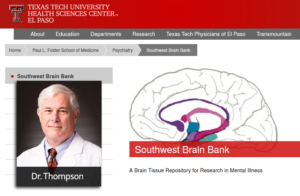SOMERSET, N.J., July 15, 2015 – The Southwest Brain Bank (SWBB) in the Department of Psychiatry at the University of Texas Health Science Center in San Antonio has received its first donation of the brain and spinal cord of a post-finasteride syndrome (PFS) patient and formed a program to collect and study post-mortem human brain and spinal cord tissue in additional patients with PFS.
 The purpose of this program is to better understand the pathology and etiology of PFS, and to better understand the effects of finasteride on the neuroanatomy and neurochemistry of the brain and spinal cord in PFS patients.
The purpose of this program is to better understand the pathology and etiology of PFS, and to better understand the effects of finasteride on the neuroanatomy and neurochemistry of the brain and spinal cord in PFS patients.
Brain and spinal cord tissue that has been donated to the SWBB will be stored in a centralized repository. Available specimens will be distributed to researchers throughout the world who are interested in studying PFS. The precious gift of brain and spinal cord donation will be provided to scientists in their efforts to study the cause and develop new treatments for PFS.
There are two ways to make a donation:
- You can make arrangements with the SWBB to donate after death. If you choose this approach, please contact the SWBB to process the authorizations and informed consent.
- Family members of deceased PFS patients may also donate their loved one’s brain and spinal cord after their death to the SWBB. As part of the donation, the family member(s) will be interviewed for a history of their loved one, including medical history, educational and occupational history, and history of cognitive, behavioral and mood symptoms. This donation is time critical. The SWBB must receive the donation within 36 hours after death and the brain cannot be embalmed or chemically fixed in any way.
The identity of each potential donor, actual brain donor and donor family will remain strictly confidential. All publication of findings are de-identified (without name and identifiable details) unless the SWBB has received permission from the family to publicize the subject’s participation.
If you would like additional information, please contact Peter Thompson, M.D. at the SWBB.
Limited funds are available from the Post-Finasteride Syndrome Foundation to cover out-of-pocket costs associated with initial neuropathological specimen cryopreservation, handling and shipment to the SWBB.
About the Southwest Brain Bank
The Southwest Brain Bank is a research organization that collects, studies, and distributes brain tissue to scientists that study mental disorders.
About Post-Finasteride Syndrome
PFS has been reported to occur in men who have taken the prescription drug finasteride to treat hair loss (under the brand name Propecia and generics), or enlarged prostates (Proscar and generics).
Symptoms include loss of libido, erectile dysfunction, depression, anxiety, panic attacks, Peyronie’s disease, penile shrinkage, gynecomastia, muscle atrophy, cognitive impairment, insomnia, severely dry skin, and tinnitus. The condition often has a life-altering impact on victims and their families, such as job loss and the breakup of marriages and romantic relationships.
In March 2015, the U.S. National Institutes of Health listed PFS on its Genetic and Rare Diseases Information Center, noting that “some patients who have taken finasteride have referred to side effects such as sexual dysfunction and depression (sometimes severe)… Studies sponsored by the NIH and other organizations are underway to better understand the effects of 5-alpha reductase inhibitor drugs.”
About the PFS Foundation
Headquartered in Somerset N.J., the PFS Foundation was established in July 2012 as a 501(c)(3) organization, with private grants from families in the U.S. and abroad. Tax-deductible financial donations to the nonprofit organization can be made via PFSFoundation.org, which also houses patient-recruitment information on active clinical studies, published research, research goals, and media reports about PFS.
# # #
Contact
Philip Roberts
Post-Finasteride Syndrome Foundation
proberts@pfsfoundation.org
(856)425-6046
